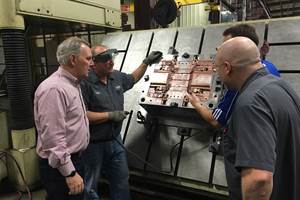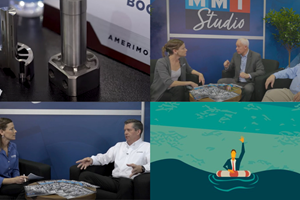Mexico is a rapidly growing location for manufacturing in North America. According to consulting agency Roland Berger, Mexico currently is the seventh largest location in the world for automotive production and wants to join the top five by 2020. For that to happen, original equipment manufacturer (OEM) suppliers and partners also would have to increase their capacities in the region of Mexico significantly, and many are doing so. New production startups require new tools and molds that must be delivered one year before production startup or general practice begins. In the case of Mexico, these tools and molds mainly have to be delivered from abroad.
Demand Is Growing Rapidly
“The industrialization phase begins when the tools for the new startups are delivered to the plants. This time is characterized by numerous, quickly occurring changes since there is no time to return the tools to a German moldmaker in Germany or elsewhere in the world. As a tool and moldmaker in the automobile sector, you have to be able to ensure local service on-site," Christian Siebenwurst, managing director of Siebenwurst Modell- und Formenbau in Dietfurt, Germany, says. “Of course, mold shops can be found locally in Mexico, but with the extremely high demand of the rapidly growing automotive industry today, these companies’ capacities are fully booked, and usually there is not enough time to wait, for example, until a local group has a five-axis machine available.”
This is why Siebenwurst established a new subsidiary in Mexico in 2014 to support German companies in the North American region. With about 800 employees in Germany, Poland, China, Mexico and the United States, Siebenwurst produces and services die casting and injection molding tools for 3D-molded parts that are made of aluminum, sheet metal and plastics. This includes integrated solutions for special processes that are used to produce large-area components with a special focus on lightweight construction solutions. As a system supplier for well-known companies from the automotive industry, Siebenwurst supports its customers from the design-model phase to series production.
“We have to be there for our customers to provide service, product development, tool maintenance and, last but not least, new product development,” Maximilian Siebenwurst, managing director of Siebenwurst Mexico, says. “Our customers include German OEMs such as Audi, Volkswagen, BMW and Daimler as well as their suppliers, who currently are expanding their capacities in the region greatly. This is why in 2014, with only four employees, we founded Siebenwurst CAD CAM Solution S. de R.L. de C.V. to provide services.
“Our cooperation partner CAD CAM Solutions was new to the Mexican market as well,” Maximilian Siebenwurst continues. “We knew our existing customers to whom we were delivering tools in Mexico, but we did not have any local contacts in Mexico at the time. To service our customers in Mexico, we then sought out local tool and mold shops in Mexico who worked for us to perform mold modifications.” According to Siebenwurst, this was not an easy task, but the company managed to establish local contacts and partners to service the molds through networking, trade shows and existing contacts. “But, you need to carefully consider with whom you want to work. By and large, you have to agree on values, how you deal with customers and the quality of claims, in spite of language barriers and cultural differences."
“When we started our operations in Mexico, we already knew two or three moldmakers, as well as some Canadian moldmakers with Mexican subsidiaries, which was a first contact,” Maximilian Siebenwurst says. “The local industry is not that huge, so you have to connect with a local community, like German moldmakers in Mexico. That is to say, you have to organize meetings through the German Chamber of Commerce.”
Siebenwurst emphasizes that it is important to start with a small team to get a sense of the new market and, in case of failure, be able to pull in the reins. But, a top priority is to have team leaders in the country who understand the technology, the business and the local market. “Getting successfully established in a new market like Mexico means working with someone who has market knowledge and contacts.”
Getting successfully established in a new market like Mexico means working with someone who has market knowledge and contacts.
Knowledge Transfer Is a Top-Priority
“Our advertising slogan, ‘German toolmaker in Mexico,’ is synonymous with claims for high quality—claims that our customers expect in the automobile industry and claims that we must live up to,” Christian Siebenwurst says. “This is why you not only must have the right partner locally but also must be able to transfer the appropriate expertise.”
According to Siebenwurst, this means, first and foremost, locating suitable employees in Germany who are prepared to travel to Mexico to supervise employee training, to ensure quality and to look after the customers. “For smaller companies like ours—in comparison to OEMs like BMW or Daimler who can offer immense incentives for their employees to go abroad—we need to convince our employees that they are part of the team, that they help this team to build up a new company abroad and that this new subsidiary in Mexico or in other countries strengthens the company,” Maximilian Siebenwurst says.
“It’s important to take away their fear that their move is about cutting their job. You need to convince them that it’s a positive challenge and a chance.”
“Once you have set up shop, experience is what counts, especially in tool and mold assembly, which means it is incredibly important to take the time to train employees locally on-site," Christian Siebenwurst says. “The employees receive three to six months of training in Mexico, depending on their educational background. Many of them come from technical colleges with a bachelor’s degree in mechanical engineering or other engineering disciplines. They are at about the same level as our apprentices during their second year of training and need to be trained on the job. It’s not a formal apprenticeship but on-the-job training to qualify them to assemble molds, operate machines or design tools. This is accepted excellently by the Mexican workers. We don't experience any problems locally.”
Since 2016, the employees also have received training for an extensive range of machinery used not only for mold and tool corrections and maintenance but also for new molds for production startups. It also helps to offer employees good working conditions, Siebenwurst says, since in Mexico there is plenty of work for trained specialists.
Today, Siebenwurst's operation has evolved from a pure service location to a fully functional manufacturing facility that implements modifications in-house and manufactures new mold and tools with a maximum weight of 30 tons. The facility features a 1200-square-meter production area. The company has invested in both three-axis and five-axis milling machines from DMG MORI, a 500-ton Williams & White die-spotting press, a mobile laser-welding machine, indoor and gantry cranes, a wire EDM machine from Mitsubishi and a die-sinking machine from ONA and the installation of a CAD/CAM workstation from Tebis.
The efforts pay off.
During the first two years, 90 percent of customers that the company served were preexisting and from Germany (they were OEMs that moved production to Mexico). New business, which the company generates from new, local customers that mostly are from the automotive sector, already accounts for 75 percent of all sales.
Meanwhile, with 25 employees at the Querétaro location, Siebenwurst is well underway in Mexico. “The market is developing extremely fast. There's a lot of work,” Maximilian Siebenwurst says.
For other mold shops looking to set up shop in Mexico, the brothers provide simple advice. They both say, “You have to have stamina. You need responsible managers with broad experience on site right from the start, and you have to create the necessary knowledge transfer if you want to land large, lucrative orders.”
About the Author
Barbara Schulz
Barbara Schulz is Gardner Business Media’s European correspondent. She can be reached at bschulz@gardnerweb.com.
Related Content
OEE Monitoring System Addresses Root Cause of Machine Downtime
Unique sensor and patent-pending algorithm of the Amper machine analytics system measures current draw to quickly and inexpensively inform manufacturers which machines are down and why.
Read MoreEditorial Guidelines: Editorial Advisory Board
The Editorial Advisory Board of MoldMaking Technology is made up of authorities with expertise within their respective business, industry, technology and profession. Their role is to advise on timely issues, trends, advances in the field, offer editorial thought and direction, review and comment on specific articles and generally act as a sounding board and a conscience for the publication.
Read MoreFrom Injection Mold Venting to Runnerless Micro Molds: MMT's Top-Viewed June Content
The MoldMaking Technology team has compiled a list of the top-viewed June content based on analytics. This month, we covered an array of topics including injection mold venting, business strategies and runnerless micro molds. Take a look at what you might have missed!
Read MoreThe Role of Social Media in Manufacturing
Charles Daniels CFO of Wepco Plastics shares insights on the role of social media in manufacturing, how to improve the “business” side of a small mold shop and continually developing culture.
Read MoreRead Next
Standardized, Automated Processes Facilitate Leap to Industrial Moldmaking
Automation and toolmaking were long considered incompatible, but times have changed. When applied correctly, automation can deliver considerable cost savings and increased manufacturing capacity. Germany-based moldmaker Hofmann is among those that successfully made the leap to industrial tool and moldmaking and that early on utilized the possibilities automation and standardization offers.
Read MoreReasons to Use Fiber Lasers for Mold Cleaning
Fiber lasers offer a simplicity, speed, control and portability, minimizing mold cleaning risks.
Read MoreHow to Use Strategic Planning Tools, Data to Manage the Human Side of Business
Q&A with Marion Wells, MMT EAB member and founder of Human Asset Management.
Read More_970x90 4.png;maxWidth=970;quality=90)


.jpg;width=700;quality=80)
.JPG;width=860)
.JPG;width=860)
.jpg;width=860)
.jpg;width=860)
.JPG;maxWidth=150;quality=70)










.jpg;maxWidth=300;quality=90)





_300x250 1.png;maxWidth=300;quality=90)







.JPG;maxWidth=400;quality=70)


